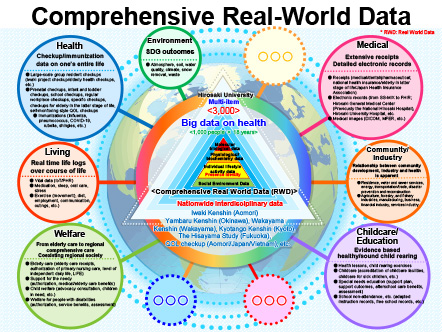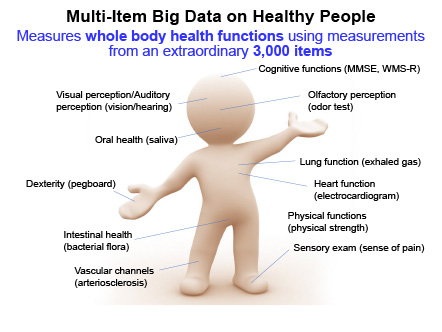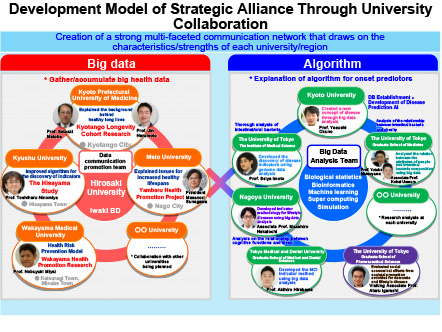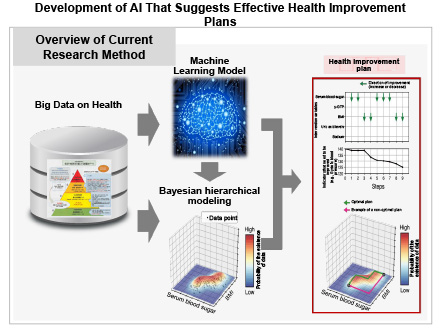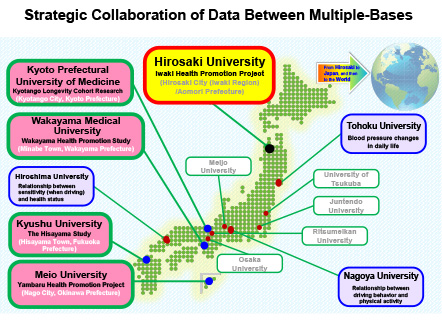Fundamental Research
Building Comprehensive Real-World Data From Unparalleled “Multi-Item Big Data on Health”
The health data being accumulated in the Iwaki Health Promotion Project Health Checkup goes beyond basic physical and biochemical data such as physical constitution, body composition, or blood and urine tests, but instead includes over 3,000 items, including everything from fitness exams (motor functions), expensive genome analyses, intestinal and oral bacteria (microbiome), fatty acid and amino acid analyses, and metabolomic analyses to data relating to individual lifestyle such as hours of sleep and diet, as well as social environmental data such as work conditions, family structure and academic history. It is a diverse and exhaustive coverage of all elements of an individual’s information. If we include health surveys conducted on elementary and middle school students (Grade 5 and above) in the same region, the data amassed through checkups is for over 20,000 people, an extremely large number. In this way, the number of people, the number of items, the comprehensive and exhaustive nature of the data on every aspect of total body health (functions), is exceptionally rare, even on a global scale, and is a major feature of our project. Another major feature of the Iwaki Health Promotion Project Health Checkup is that participants are almost all healthy, so the data obtained from the checkups is longitudinal data on healthy people, which is crucial for the study of prevention.
At COI-NEXT, in addition to the results obtained from the analysis of the multi-item big data on health, we will gather a wide range of health data throughout a person’s entire life through the implementation of things such as self-monitoring style “QOL Checkups” and receipt or checkup data which utilize the Second Generation Medical Infrastructure Act*1, and is managed by Hirosaki City. Furthermore, utilizing the PHR (Personal Health Records)*2 which span the lives of residents, and by merging life logs and health data with comprehensive real-world data with the person’s consent, we aim to realize a social system that provides beneficial personalized feedback about health evaluation, interest in health and information on health awareness.
*1 For authorized businesses, it became possible to obtain personal information requiring special consideration from insurers by opting out. In addition, it also became possible to use collected anonymous medical treatment information for the creation of new industries and for research and development that contribute to the formation of a society with extended longevity.
*2 “Personal Health Records” are electronic records of an individuals’ health status, medication, etc. meant for the individual or family members, and is intended improve daily lifestyle habits and overall health.
The analyses of multi-item big data on health collected by the Iwaki Health Promotion Project is performed in nearly all medical and undergraduate courses at Hirosaki University, in addition to big data analysis task teams composed of top level biometric, clinical statistic, bioinformatic and AI specialists at Kyoto University, the University of Tokyo, the University of Tokyo Institute of Medical Science, Nagoya University, and Tokyo Medical and Dental University, among others. Furthermore, specialists from a variety of fields from businesses/industries participating in the site come together and work on the analyses under a strategic alliance where they make use of each other’s strengths.
We have seen numerous results to this point. One of the results, from Professor Okuno and his research team at Kyoto University, combined machine learning and Bayesian hierarchical modeling*3, a type of AI technology. His team succeeded in developing AI that can suggest an optimal and effective personalized health improvement plan based on individual health data. This research result was published in the online version of “Nature Communications.”
With our site as the main focal point, and the multi-item big data on health collected from the Iwaki health Promotion Project Health Checkup as a hub, we promote initiatives that lead to new research and results by collaborating and including a variety of health/medical data including the cohort research that is being performed all across the country. Under the operation of a strict personal information management system, we developed an infrastructure for national longitudinal data collaboration by implementing analyses that include the health data from research at Kyoto Prefectural University of Medicine (Kyotango Longevity Cohort Research), Kyushu University (The Hisayama Study), Meio University (Yambaru Health Promotion Project) and Wakayama Medical University (Wakayama Health Promotion Research). With the advancement of reciprocal and complementary collaborative analyses as well as comparative analyses, strategic data collaboration between universities is steadily taking form.
In this way, our research is progressing quickly through collaboration with the teams that gather and accumulate the multi-item big data on health, and strategic cyber teams that shed light on the mechanisms of predicting the onset of disease (big data analysis teams).
*3 A type of statistical modelling method. By learning the tendencies of the overall data and individual (or group) tendencies, it becomes possible to extract data from a mixture of several distributions.



